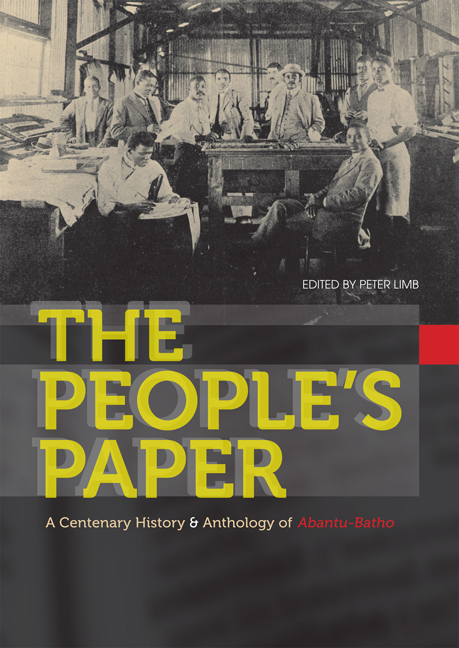Book contents
- Frontmatter
- Contents
- Contributors
- Acknowledgements
- Preface
- List of Abbreviations and Acronyms
- List of Illustrations
- PART I Essays
- Overview
- FOUNDERS AND EDITORS
- Chapter 3 Pixley Seme and Abantu-Batho
- Chapter 4 Queen Labotsibeni and Abantu-Batho
- Chapter 5 ‘We of Abantu Batho’: Robert Grendon's Brief and Controversial Editorship
- THEMES AND CONNECTIONS
- PART II Anthology
Chapter 5 - ‘We of Abantu Batho’: Robert Grendon's Brief and Controversial Editorship
from FOUNDERS AND EDITORS
Published online by Cambridge University Press: 21 April 2018
- Frontmatter
- Contents
- Contributors
- Acknowledgements
- Preface
- List of Abbreviations and Acronyms
- List of Illustrations
- PART I Essays
- Overview
- FOUNDERS AND EDITORS
- Chapter 3 Pixley Seme and Abantu-Batho
- Chapter 4 Queen Labotsibeni and Abantu-Batho
- Chapter 5 ‘We of Abantu Batho’: Robert Grendon's Brief and Controversial Editorship
- THEMES AND CONNECTIONS
- PART II Anthology
Summary
Late in 1912 Pixley ka Isaka Seme travelled to Swaziland to acquire a printing press for his projected newspaper, Abantu-Batho. This may have been the equipment rendered redundant by the demise of The Times of Swaziland a few years earlier. According to Selby Msimang, this ‘printing plant [was] a gift from the Queen-Regent of Swaziland’, Labotsibeni.
While the British appropriated the greater part of her income shortly after they usurped Swaziland's government in 1904, the queen remained in 1912 one of the wealthiest black women in Southern Africa. She deployed vestiges of her pre-colonial power and wealth – grudgingly conceded by the interlopers – with consummate adroitness. If illiterate, she was acutely conscious of the value of printed texts and book learning and, according to Hilda Kuper, alive to the necessity of fighting
the Europeans with their own weapons. ‘In what does the white man's power lie?’ the Queen Regent, Gwamile [Labotsibeni], once asked Robert Grendon, a Coloured man she brought from Natal as tutor for her grandson [i.e. the future King Sobhuza II]. Before he could answer, she continued: ‘It lies in money and in books. We too will learn; we too will be rich.’
In October 1906 Grendon (c.1867–1949) found himself at the royal village, Zombodze, summoned by the queen to serve her as schoolmaster to the children of highborn Swazis and distinguished commoners. The fledgling white administration in Mbabane launched inquiries and learnt of his earlier anti-government activities in Natal. As a result, he was not allowed to teach at Zombodze school.
Instead, in late December he was appointed schoolmaster at Mahamba mission on Swaziland's south-western border, a school, it would seem, sponsored in part by the queen. It was reported that Grendon administered the school without recourse to Swazi national funds. It was here that her youngest son, Prince Lomvazi, received some of his schooling.
Later Grendon did teach at Zombodze and in 1911 was mentoring Prince Lomvazi. For his services the queen paid him £10 per month. In December 1911 he escorted Lomvazi to the New Comet and Cason goldmines on the Witwatersrand to check on the well-being of his people living in the compounds.
- Type
- Chapter
- Information
- The People’s PaperA Centenary History & Anthology of Abantu-Batho, pp. 151 - 172Publisher: Wits University PressPrint publication year: 2012



